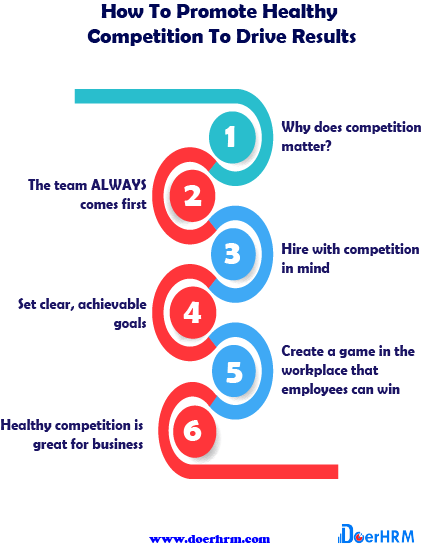In a workplace setting, healthy competition is a vital stimulant that motivates employees to achieve the best possible results for your company. Fostering an optimum level of competition between colleagues can boost productivity and give your staff a sense of achievement when completing their day-to-day tasks. However, too much competition can have the opposite effect and can create chasms between teams and result in a hostile environment that can actually stifle productivity.
The trick is to ensure there is a culture within your company that encourages healthy competition, but equally, your employees know where to draw the line and don’t get too carried away. In this video, we explore several ways in which you can promote healthy competition in your company to drive the best possible results for your business metrics.
Why does competition matter?
Competition in the workplace is vital to keep employees motivated and stimulated. Research cited in Top Dog: The Science of Winning and Losing suggests that over 50% of people benefit from competition. A competitive edge in your workplace drives people to succeed, achieve their targets and goals, keep them on their toes, and reduce complacency. If there is no competition, people will get too comfortable and may not be motivated to continue delivering excellent results.

The team ALWAYS comes first
Healthy competition is undoubtedly a good thing, but it must translate into a successful and motivated team. Competition for competition’s sake breeds mistrust, envy, and disassociation and is not conducive to a productive workplace. If you look at any elite sports team, you can see how healthy competition helps deliver results. The best squads of players have multiple players in each position, who train hard each week to impress their coaches, hoping that they will get selected to represent the team in the fixture at the weekend. The same mentality should be adopted in your company. If your employees spend each week trying to prove to you and their teammates how valuable they are and how much they can contribute, this inspires others to do the same.
Hire with competition in mind
When you’re interviewing people for a role on your team, you should evaluate their personality traits and character, as well as their competencies and experience. Although you want to avoid people who come across as arrogant, you should ascertain whether the person you wish to employ is competitive and wants to thrive in their role. If you can find a goal-oriented person who is motivated to achieve the best possible results, then chances are they will thrive in a competitive environment in the workplace. Ask the right questions to understand a person’s motivation and try and understand what success looks like to them.
Set clear, achievable goals
Goal setting is a critical element of motivating your team and fostering healthy competition in the workplace. If you set realistic, achievable goals for each individual within the group, they will be encouraged to achieve them in the agreed timeframe. Also, if you set similar goals for all team members, then they will be motivated to do as well as, if not better than, their teammates. Moreover, in addition to individual goals, you should also set clear and achievable team goals. This way, you are creating an environment of accountability, and each member of the team has to pull his/her weight to ensure the whole team can meet their joint goals. People will automatically become competitive during this process, as they will not want to be the ones to let down the rest of the team.
Provide constructive feedback
Equally as important as goal setting, constructive feedback delivered consistently is imperative when fostering healthy competition in the workplace. To ensure that competition doesn’t get out of hand, the team leader must direct and channel employee enthusiasm in the right way. Also, feedback is a vital tool for self-improvement, and when things aren’t going quite to plan, constructive feedback can help employees understand where they’ve gone wrong and refocus their priorities. A great example of delivering constructive feedback is the sandwich method. You layer your negative feedback in between two pieces of positive feedback. Although controversial, it does actually work in many instances!
Create a game in the workplace that employees can win
There’s no better way of ensuring healthy competition in the workplace than creating an actual game that people can win, depending on their actions and contribution. People love playing games, and they are a fun way of keeping people motivated when they’re working toward their individual targets and goals. A great example of fun, incentive-based games that can be played in the workplace are initiatives like the employee of the month. As long as everyone is clear on the prize and they understand how they can win, you will see healthy competition fostered. Furthermore, don’t be scared to incorporate other games and fun activities into the workday. Encouraging play is a sure-fire way of normalizing healthy competition and is often much appreciated by your team.
Conclusion: healthy competition is great for business
Fostering healthy competition in the workplace is undoubtedly good for business metrics. You should ensure that there are clear expectations within the team and that everyone is working towards both individual and team goals to stay motivated and inspired to deliver outstanding results for your business.
If you’re able to hire new staff, make sure the people you invite to join your team have a competitive streak and fit into the workplace culture you are trying to create. Perhaps the most important thing to remember when encouraging healthy competition at work is that the team always comes first. As soon as people begin sacrificing the team for personal advancement or gain, you need to provide them with constructive feedback so they can once again channel their energy in the right way and contribute to the bigger picture.
To learn how OKRs can help take your team to the next level, enroll in our OKR Mastery course and earn a 35% commission when you invite others to join this course!






